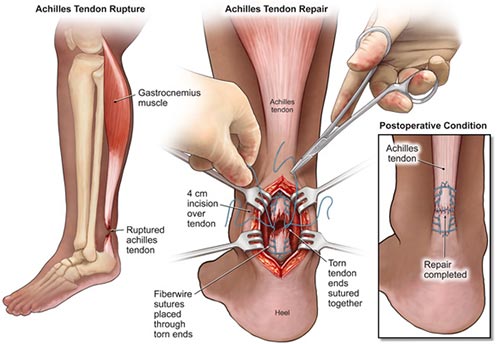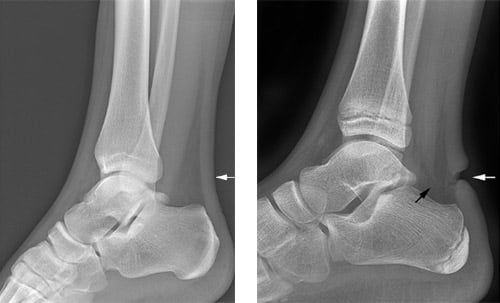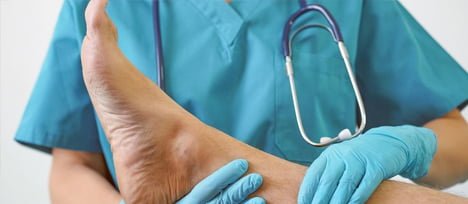Achilles Tendon Surgery
The Achilles tendon is prone to injury and pain due to the enormous demand the body places on it during physical activity and certain anatomical factors that leave it less able to repair itself after injury. Most cases of Achilles pain can be treated through physical therapy and orthotics, but when the tendon becomes torn, ruptured, or has developed significant scar tissue, then Achilles Tendon Surgery becomes an option to discuss with your doctor.
What Is the Achilles Tendon?

Tendons are rope-like structures that connect your muscles to your bones. When your muscle contracts, it pulls on the tendon, which in turn moves the joint. Your Achilles tendon is the strongest and largest tendon in your body, allowing your body to perform incredible things like sprinting and jumping. The force needed to push your foot down when you walk or run is generated by your Achilles tendon.
This tendon is very strong and very taut. If you overstretch the tendon, it can tear or even completely rupture. Most often, this injury happens during recreational sports activities. If the tendon is torn or ruptured, Achilles tendon rupture surgery may be recommended depending on your activity level and other factors. Injuries require a prompt visit to a podiatrist who will recommend an appropriate Achilles tendinitis treatment.
Causes of Achilles Tendon Tear
Achilles tendon tears can be caused by excessive force or strain on the tendon. Some of the most common causes of Achilles tendon tears are:
- Falling or tripping
- Increasing your workout strain too rapidly
- High impact sports
Achilles tendon ruptures usually are caused by forceful loading of the foot and ankle either when pushing off or when hitting the ground after jumping. An Achilles tendon rupture often results in sharp pain and swelling of the calf muscle.
”
★ ★ ★ ★ ★
The doctor is courteous, professional, and to the point. He does not keep patients waiting and spends ample time with them. I have seen him several times for foot issues, and I have been satisfied each time with his skill in assessing and care for each patient.
Types of Achilles Tendon Injury
There are two types of Achilles tendinitis you can suffer from. Your foot doctor in New York can diagnose your Achilles tendon issue with an examination and some confirming tests, including XRay and ultrasound. The two issues you can have with your Achilles tendon:

- Insertional Achilles Tendinitis – occurs near the back of your heel where the tendon attaches. It may be accompanied by additional bone growth referred to as either a bone spur or heel pain. Frequently this damage at the tendon attachment occurs in people who aren’t active.
- NonInsertional, Achilles Tendinitis – Occurs just above one’s heel along the length of the Achilles tendon. This is the most common form and is primarily seen in athletes and active adults. Your foot doctor in New York can evaluate and diagnose the cause of this pain and treat it from its root. With this type of tendinitis, swelling and inflammation will often be observed by your podiatric doctor during the early stages of this condition. Your podiatric doctor will spend time creating a patient-specific Achilles tendonitis treatment plan for your tendinitis. In rare cases, Achilles heel surgery might be required.
Seek Medical Attention
Make an appointment to see your NYC Achilles tendon doctor or podiatrist immediately following your Achilles tendon injury to get a thorough examination and diagnosis. The examination by a podiatrist will typically include a clinical exam as well as imaging studies to confirm the diagnosis made by your New York foot doctor. An MRI is a painless way to provide images of your body’s soft tissues and is often utilized to diagnose Achilles tendon pain.
Your NYC Achilles tendonitis treatment specialist offers a variety of the newest options to treat Achilles tendon. At our New York podiatry center, the newest Achilles Tendon surgery is only performed when conservative, non-surgical solutions don’t alleviate your Achilles tendonitis pain. Our doctors and New York Achilles tendon surgeons will choose the newest procedure that corrects your deformity with minimal scarring and recovery time.
Come see the Achilles tendonitis Manhattan treatment center and meet our top-rated Achilles tendon doctors in NYC. Every patient is treated with experience, skill, knowledge, and compassion. Get the Achilles tendon treatment you need in the safe, reassuring hands of the best Achilles tendon surgery specialists in NYC.
Achilles Tendinitis Treatment Options
It may be recommended for younger, more active individuals to have a surgical repair of a ruptured Achilles tendon to get the best chance at a full recovery. In older or less active people, conservative or non-surgical treatment in a cast may be enough to ensure a healthy recovery.
Conservative care
A cast or walking boot with a wedge in the heel to keep your foot at the correct angle for proper healing is usually worn for 6-8 weeks. This allows the torn fibers to repair and strengthen without the constant stretching caused by the ankle joint movement. A podiatrist will make sure you have the proper Achilles tendonitis treatment for optimal healing and prompt return to your activity level present before the injury.
Surgery
If your Achilles tendon is surgically repaired, your New York City podiatric surgeon typically allows the patient to return home for recovery the same day as the Achilles heel surgery procedure. A cast is typically worn the first few weeks, and the patient is transitioned to a walking boot.
How Is Achilles Tendon Surgery Performed
Achilles tendon surgery is typically performed under general anesthesia. Your Manhattan Achilles tendon doctor will make a small incision on the back of your ankle or leg to repair the tendon.
Depending on the extent of your injury, one or more Achilles tendon treatments are employed:
- If the Achilles tendon has deteriorated, a portion of it may be removed.
- If there are bone spurs, they are removed to prevent them from causing more damage.
- If it’s a particularly bad tear, your Achilles may be reinforced with a tendon or graft.
- If necessary, a podiatrist/surgeon will lengthen your calf muscles.
Once the damage has been removed or repaired, your Achilles tendon is re-attached to your heel bone. The incision is sewn closed, and the wound protected. As with any surgery, complications such as infections and nerve damage can occur during Achilles surgery. Your foot surgeon will explain all risks, benefits, and alternatives during your office visit.
If you are in New York City and would like to learn more about the surgical repair of the Achilles, please contact us today.
Is Achilles Tendon Surgery Painful?
A ruptured Achilles tendon can cause pain similar to getting kicked in the calf. If your Manhattan foot doctor recommends surgery, general anesthesia is administered during Achilles tendon surgery. Right after surgery, you will need to keep your leg elevated to reduce swelling. In about 10 days, your foot doctor will put your leg in a splint or cast. In about a few weeks, you will be able to put pressure on your foot.
According to the study published on PubMed, “89.6% of patients resumed sports activity with an average delay of 7.7 months (4–24) and 57.7% of them resumed at a level equal or superior to their level before injury.”
An Achilles tendon rupture is painful, however, after successful surgery and necessary rupture recovery time, you will be able to return to regular activities with no more pain.
Rehabilitation After Achilles Tendon Surgical Procedure
Postoperative management can affect the speed of rehabilitation, return to work and return to sporting activity.

After Achilles heel surgery, a good podiatrist will prescribe an intensive rehabilitation program. At first, your Achilles tendon doctor in Manhattan will keep you in a cast and recommend keeping your leg elevated as much as possible. In about two weeks, you will follow up with your podiatric doctor in New York, who may remove your sutures. Complete recovery after Achilles tendon surgery takes more time, but with proper Achilles tendonitis treatment, you can be back to playing sports in a few months.

When you begin your rehab program, it involves a gradual strengthening and conditioning of your tendon and the muscles surrounding it to make it strong and increase its flexibility. This helps prevent re-injury. Physical therapy plays a key role in your complete Achilles tendon surgery recovery. You should be able to resume normal activities, including sports, in four to six months.
How to Prevent an Achilles Tendon Rupture?
You can improve your chances of avoiding an Achilles tear in the future with a few simple tips. While these suggestions can’t guarantee your health, you’re less likely to have a problem if the muscles and tendons in your feet and legs are toned and strong. Try these:
- Vary your exercise routine. Alternate high- and low-impact activities, doing things like biking one day and swimming the next.
- Strengthen and stretch your calf muscles. Stretch to the point where you feel the pull, but not the pain. Do not bounce during stretching.
- Slowly build intensity. One of the most common ways to injure your Achilles tendon is to abruptly increase the difficulty of your exercise routine. Build by no more than 10 percent each week.
- Pay attention to running surfaces. Don’t run on surfaces that are too hard or slippery. Wear shoes that are supportive and meant for the sport you are participating in.
Your Achilles tendon doctor in NYC may suggest more specific exercises aimed at building strength in the muscles around your Achilles tendon. Follow the advice, and you may not need Achilles heel surgery.
All symptoms, potential procedural/surgical options should always be discussed with your podiatrist after a thorough consultation and examination for an accurate diagnosis and Achilles tendonitis treatment plan.
Do you have any questions about Achilles Tendon Surgery or repair in NYC? Would you like to schedule an appointment with a top NYC podiatrist and Achilles tendon doctor at Manhattan Foot Specialists? Please contact our office for a consultation.
Manhattan Foot Specialists (Midtown) 56 W 45th St, Ste 802, New York 10036
Manhattan Foot Specialists (Union Square) 55 W 17th St Ste 102, New York 10011
Manhattan Foot Specialists (Financial District) 80 Maiden Lane, Ste 1204, New York 10038
